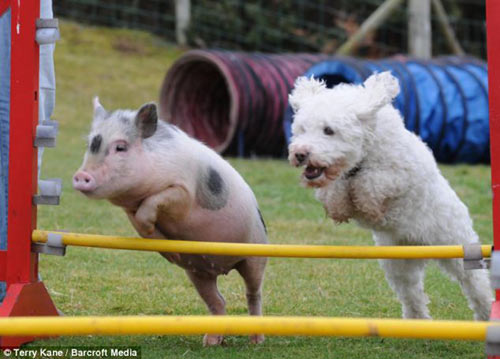Albuquerque Journal Article – Holiday Dietary Indiscretion
Our American tradition of conspicuous Christmas consumption isn’t just for humans. Your pet can be a pig even without being a pet pig.
Edibles: Alcoholic beverages, chocolate, coffee (grounds, beans, chocolate covered espresso beans), spoiled and fatty foods, onions, onion powder, salt, yeast dough and marijuana are all dangerous and potentially deadly for pets.
Plants: Lilies are potentially deadly for cats; poinsettias may cause vomiting or nausea; mistletoe can trigger heart problems but usually just stomach upset; and holly leads to vomiting, nausea, diarrhea, and lethargy.
Drinking fertilized Christmas tree water causes stomach upset. Consuming stagnant tree water (and whose isn’t?), a bacterial breeding ground, leads to vomiting, nausea, and diarrhea. Chewing electric cords can result in oral burns or electrocution. Ribbons or tinsel can get caught in the intestines and cause obstruction. Chewing and swallowing batteries promotes oral, stomach, and intestinal ulceration. Dogs lapping liquid potpourri or cats rubbing against leaky containers and then self-grooming can suffer severe oral, skin, and eye damage. Chewing glass ornaments is not consistent with a merry Christmas.
Drugs: Even small doses of pain relievers, cold medicines, anti-cancer drugs, antidepressants (cats love Effexor), vitamins, and diet pills can be lethal. One ibuprofen tablet can cause stomach ulcers in a 10-pound dog. Less than one acetaminophen tablet is dangerous to a cat. Check with your veterinarian before giving any medication.
A sugar substitute called xylitol, that’s poisonous to dogs, sweetens a growing list of candy, mints, chewable vitamins, and almond and peanut butter. It’s healthy enough for people but it can reduce blood sugar and cause hypoglycemic seizures and even liver failure in dogs. Read package labels. Pets suspected of ingesting xylitol need medical attention ASAP. Waiting for convulsions is a bad gamble.
Canine stocking stuffers: The FDA warns that the bits and chunks of animal skeletons, compressed into bone shapes, and sold as “bone treats” can break apart when chewed. Swallowing these hunks and chunks causes injuries to the gums, choking, intestinal blockages, vomiting, diarrhea and rectal bleeding. Food-dispensing toys and puzzles will keep cat or dog safely focused on natural foraging. There is nothing wrong with working for one’s sustenance.
Keep the ASPCA Animal Poison Control Center phone number handy (1-888-4-ANI-HELP). Have a safe and merry Christmas.
Each week Dr. Jeff Nichol makes a short video or podcast to help bring out the best in pets. Sign up at no charge at drjeffnichol.com. Dr. Nichol treats behavior disorders at the Veterinary Emergency & Specialty Centers in Albuquerque and Santa Fe (505-792-5131). You can post pet behavioral or physical questions at facebook.com/drjeffnichol or by US Post to 4000 Montgomery Blvd. NE, Albuq, NM 87109.


